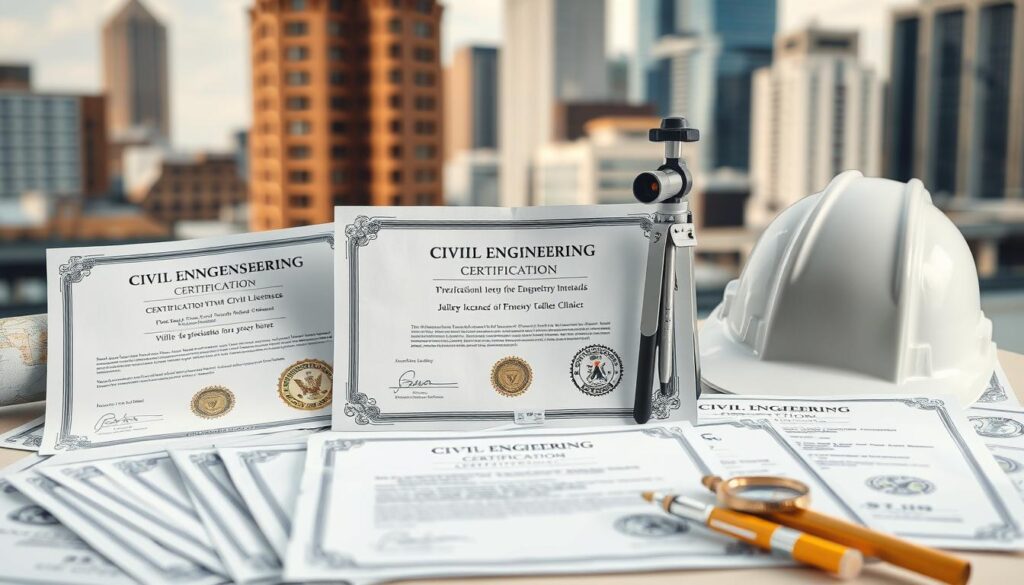Are you wondering what it takes to launch a successful career in civil engineering? To succeed in this dynamic field, it’s crucial to understand the essential qualifications and skills required for entry-level positions. As a friendly guide, we’ll walk you through the necessary steps to get started.
Civil engineering is a diverse field that encompasses various disciplines, including construction, transportation, and water resources. To excel in this field, you’ll need to possess a combination of technical skills, knowledge, and soft skills.
Key Takeaways
- Understand the essential qualifications for entry-level civil engineers
- Learn about the key skills required for success in the field
- Discover the importance of technical skills and knowledge
- Explore the role of soft skills in civil engineering
- Get started on your path to a successful civil engineering career
Introduction to Entry-Level Civil Engineering Roles
Entry-level civil engineering roles are the stepping stones for a successful career in this dynamic field. These positions not only provide a foundation for professional growth but also play a critical role in the development of infrastructure projects.
Overview of the Civil Engineering Field
Civil engineering is a professional engineering discipline that deals with the design, construction, and maintenance of the physical and naturally built environment. It includes various subfields such as structural engineering, transportation engineering, and water resources engineering.
Key aspects of the civil engineering field include:
- Design and development of infrastructure projects
- Collaboration with architects, engineers, and construction teams
- Conducting site investigations and analyzing data
- Ensuring compliance with regulations and safety standards
Importance of Entry-Level Positions
Entry-level positions in civil engineering are vital for several reasons. They provide recent graduates with hands-on experience, allowing them to apply theoretical knowledge in real-world scenarios. These roles also help in developing essential skills such as problem-solving, teamwork, and communication.
| Benefits of Entry-Level Positions | Description |
|---|---|
| Practical Experience | Gaining hands-on experience in civil engineering projects |
| Skill Development | Developing technical and soft skills necessary for career advancement |
| Networking Opportunities | Building professional connections within the industry |
By understanding the importance of entry-level civil engineering roles, individuals can better prepare themselves for a successful career in this field.
Educational Requirements for Civil Engineers
To become a civil engineer, one must meet specific educational requirements that lay the foundation for a successful career. The field of civil engineering demands a strong academic background to ensure that professionals are equipped to handle complex projects and contribute to the development of infrastructure.
Necessary Degrees for Civil Engineering
A bachelor’s degree in civil engineering or a related field is typically the minimum educational requirement for entry-level positions. The degree program should be accredited by a recognized accrediting agency to ensure that it meets the necessary standards. Coursework in civil engineering typically includes subjects such as mathematics, physics, materials science, and engineering mechanics.

Accreditation of Engineering Programs
Accreditation is a critical factor in the selection of an engineering program. In the United States, the Accreditation Board for Engineering and Technology (ABET) is the primary accrediting agency for engineering programs. ABET accreditation ensures that a program meets the quality standards and provides students with the necessary knowledge and skills to succeed in their careers. When choosing a civil engineering program, it is essential to verify that it is ABET-accredited.
By focusing on accredited programs and relevant coursework, aspiring civil engineers can gain the knowledge and skills necessary to excel in their careers and meet the qualifications required for entry-level positions.
Key Skills for Aspiring Civil Engineers
Civil engineering aspirants need to develop a comprehensive skill set that includes both technical expertise and interpersonal abilities. This blend of skills is crucial for success in the field, enabling engineers to not only design and develop infrastructure projects but also to effectively collaborate with teams and communicate with clients.
Technical Skills in Civil Engineering
Technical skills are the backbone of a civil engineer’s profession. These include:
- Proficiency in CAD software and other engineering design tools.
- Understanding of mathematical and physical principles underlying civil engineering.
- Familiarity with project management software to plan, coordinate, and monitor projects.
These technical skills are essential for designing, analyzing, and implementing infrastructure projects. Continuous learning is necessary to stay updated with the latest technologies and methodologies.
Interpersonal and Communication Skills
Equally important are the interpersonal and communication skills that enable civil engineers to work effectively with various stakeholders. Key skills include:
- Effective communication to convey complex technical information to non-technical stakeholders.
- Teamwork and collaboration to work seamlessly with multidisciplinary teams.
- Problem-solving to address and resolve project-related issues efficiently.
Developing these skills through training and practice can significantly enhance a civil engineer’s ability to manage projects and lead teams.
Relevant Certifications for Entry-Level Engineers
For entry-level civil engineers, acquiring the right certifications can be a game-changer, opening up new opportunities and career advancement paths. Certifications not only validate an engineer’s skills and knowledge but also demonstrate a commitment to professional development.
Importance of Certifications
Certifications play a crucial role in the career development of entry-level civil engineers. They offer a competitive edge in the job market by showcasing specialized skills and knowledge. Many certifications are recognized industry-wide, making them a valuable asset for engineers looking to advance their careers.
Key benefits of certifications include:
- Enhanced job prospects
- Demonstrated expertise in specific areas of civil engineering
- Increased earning potential
- Opportunities for career advancement
Popular Certifications to Consider
Several certifications are particularly relevant for entry-level civil engineers. These include:
Professional Engineer (PE) License: While not always required for entry-level positions, obtaining a PE license can significantly enhance career prospects. It demonstrates a high level of competence and is often seen as a mark of excellence in the field.
Certified Construction Manager (CCM): This certification is ideal for those interested in the construction aspect of civil engineering. It validates knowledge and skills in managing construction projects.

- Certified in Risk and Information Systems Control (CRISC)
- Project Management Professional (PMP)
- LEED AP (Leadership in Energy and Environmental Design Accredited Professional)
These certifications can significantly enhance an entry-level engineer’s career prospects by demonstrating specialized knowledge and a commitment to professional development.
Gaining Experience through Internships
For entry-level civil engineers, internships are a gateway to gaining practical experience and enhancing job readiness. Internships provide a unique opportunity to apply theoretical knowledge in real-world settings, making them an indispensable part of civil engineering education.
How Internships Enhance Job Readiness
Internships significantly enhance job readiness by providing hands-on experience with industry-standard tools and technologies. Participants gain a deeper understanding of civil engineering principles and practices, which is crucial for their future careers.
Key benefits of internships include:
- Practical experience with real-world projects
- Development of problem-solving skills
- Exposure to industry-standard software and technologies
- Opportunities to build professional networks
By participating in internships, aspiring civil engineers can demonstrate their capabilities to potential employers, making them more competitive in the job market.
Tips for Securing Engineering Internships
Securing an internship requires strategic planning and preparation. Here are some tips to increase your chances:
- Update your resume to highlight relevant coursework, skills, and any previous experience.
- Utilize your university’s career services to find internship opportunities.
- Network with professionals in the field through industry events and online platforms.
A well-structured application, combined with a proactive approach to seeking opportunities, can significantly enhance your prospects of securing a valuable internship.
| Internship Benefits | Description |
|---|---|
| Practical Experience | Gaining hands-on experience with real-world projects |
| Skill Development | Developing problem-solving skills and industry-specific knowledge |
| Professional Networking | Building connections with professionals in the field |
The Role of Software Proficiency in Civil Engineering
Software proficiency is redefining the civil engineering profession, enhancing both productivity and precision. As the field continues to evolve, the ability to effectively utilize various software tools has become a critical skill for civil engineers.
In the modern civil engineering landscape, proficiency in specific software is not just an asset but a necessity. It enables engineers to design, analyze, and manage projects more efficiently. The use of software tools streamlines processes, reduces errors, and improves overall project outcomes.
Essential Engineering Software to Learn
Civil engineers should familiarize themselves with a range of software applications to stay competitive. Some of the essential tools include:
- Computer-Aided Design (CAD) software for drafting and design
- Building Information Modeling (BIM) for comprehensive project modeling
- Finite Element Analysis (FEA) for structural analysis
- Geographic Information Systems (GIS) for spatial data analysis
Mastering these tools can significantly enhance a civil engineer’s job prospects and productivity. Employers often look for candidates with hands-on experience in these software applications.
Importance of Computer-Aided Design (CAD)
Computer-Aided Design (CAD) is a cornerstone of civil engineering software. It allows engineers to create precise 2D and 3D models, facilitating the design process and enabling the visualization of complex projects. CAD software is indispensable for drafting, design, and documentation.
The importance of CAD lies in its ability to improve design accuracy, enhance collaboration among project stakeholders, and streamline the transition from design to construction. Proficiency in CAD is a fundamental requirement for civil engineers, as it directly impacts their ability to deliver projects efficiently and effectively.

In conclusion, software proficiency is a vital component of a civil engineer’s skill set. By focusing on essential engineering software and mastering tools like CAD, civil engineers can significantly enhance their career prospects and contribute to the successful execution of complex projects.
Understanding Project Management Basics
For entry-level civil engineers, learning project management basics is essential for career advancement and project success. Project management involves planning, organizing, and controlling resources to achieve specific goals. It is a critical aspect of civil engineering that ensures projects are completed on time, within budget, and to the required quality standards.
Introduction to Project Management Principles
Project management principles provide a framework for managing projects effectively. These principles include:
- Scope Management: Defining what needs to be done.
- Time Management: Scheduling tasks and ensuring timely completion.
- Cost Management: Budgeting and cost control.
- Quality Management: Ensuring the project meets the required standards.
Understanding these principles helps entry-level civil engineers perform their job duties more effectively, contributing to the overall success of the project.
Relevant Tools for Project Management
Several tools are available to support project management in civil engineering. Some of the most commonly used tools include:
| Tool | Description | Benefits |
|---|---|---|
| Microsoft Project | A project management software that helps plan, organize, and control projects. | Enhances scheduling and resource allocation. |
| Asana | A task management tool that helps teams track work and collaborate. | Improves team collaboration and task tracking. |
| Autodesk Project Management | A construction project management software that streamlines project delivery. | Enhances project visibility and collaboration. |
By familiarizing themselves with these tools, entry-level civil engineers can improve their project management skills, making them more valuable to their employers.
In conclusion, understanding project management basics is crucial for entry-level civil engineers. By grasping project management principles and utilizing relevant tools, they can significantly enhance their job performance and contribute to the success of their projects.
Professional Networking for New Engineers
Professional networking plays a vital role in the career development of new engineers, offering them valuable insights and opportunities. As new engineers embark on their careers, establishing a strong network can significantly impact their ability to secure entry-level civil engineering positions and grow professionally.
Importance of Networking in Civil Engineering
Networking in civil engineering is crucial as it allows new engineers to connect with experienced professionals, learn about industry best practices, and stay updated on the latest trends and technologies. Through networking, new engineers can gain access to mentorship, job opportunities, and collaborative projects that can enhance their skills and knowledge.
Building a professional network can open doors to new opportunities, including job openings that may not be advertised publicly. It also provides a platform for new engineers to showcase their skills and accomplishments, potentially leading to career advancement opportunities.
Ways to Build Professional Connections
There are several ways new engineers can build their professional connections in the civil engineering field. Attending industry conferences and seminars is an effective way to meet other professionals and learn about the latest developments in the field. Joining professional organizations, such as the American Society of Civil Engineers (ASCE), can also provide opportunities for networking.
Another effective strategy is to leverage social media platforms, particularly LinkedIn, to connect with other professionals, join relevant groups, and participate in discussions. Volunteering for projects or committees within professional organizations is another way to demonstrate one’s capabilities and commitment to the field, while also expanding one’s network.

By actively engaging in these networking activities, new engineers can establish a strong foundation for their careers, gain visibility, and access opportunities that can help them grow professionally in the civil engineering industry.
Resume Tips for Entry-Level Civil Engineering Jobs
Crafting a compelling resume is crucial for entry-level civil engineers aiming to stand out in a competitive job market. A well-structured resume not only highlights your technical skills and qualifications but also showcases your ability to communicate effectively.
Structure and Format of an Effective Resume
To create an impactful resume, consider the following structure:
- Begin with a professional summary that highlights your entry-level civil engineering skills and career objectives.
- List your educational background, including relevant coursework and academic achievements.
- Detail your technical skills, such as proficiency in CAD software and other engineering tools.
- Include any relevant internships or projects that demonstrate your practical experience.
- Mention your soft skills, such as teamwork, communication, and problem-solving abilities.
Keywords to Include for Visibility
Incorporating the right keywords can significantly enhance your resume’s visibility, especially when applying through online portals. Here are some tips:
- Use keywords related to entry-level civil engineering skills, such as “structural analysis,” “project management,” and “site inspection.”
- Tailor your resume for each job application by mirroring the keywords used in the job description.
- Avoid keyword stuffing; ensure the keywords are naturally integrated into your resume content.
By following these resume tips, entry-level civil engineers can increase their chances of making a positive impression on potential employers and securing their desired job in the competitive civil engineering field.
Preparing for the Interview Process
Preparing for a civil engineering interview requires a strategic approach to showcase your skills and knowledge. Understanding the requirements for entry-level civil engineering jobs is crucial to acing the interview.

To start, familiarize yourself with the common interview questions asked in civil engineering interviews. These questions often assess your technical knowledge, problem-solving abilities, and understanding of engineering principles.
Common Interview Questions for Civil Engineers
Civil engineering interviews typically include a mix of technical and behavioral questions. Here are some examples of common interview questions:
- What inspired you to pursue a career in civil engineering?
- Can you describe a challenging project you worked on during your internship or studies?
- How do you stay updated with the latest developments in civil engineering?
- What do you know about our company, and why do you want to work here?
To prepare for these questions, review your coursework, projects, and any relevant experience. Practice articulating your thoughts clearly and concisely.
Tips for a Successful Interview
A successful interview is not just about answering questions correctly; it’s also about presenting yourself confidently and professionally. Here are some tips to enhance your interview performance:
| Tip | Description |
|---|---|
| Research the Company | Understand the company’s projects, values, and culture to show your interest and enthusiasm. |
| Review Your Resume | Be prepared to discuss your resume in detail, highlighting your relevant skills and experiences. |
| Practice Common Questions | Rehearse your responses to common interview questions to boost your confidence. |
| Dress Professionally | Make a good impression by dressing appropriately for the interview. |
By following these tips and preparing thoroughly, you can significantly improve your chances of success in a civil engineering interview. Remember, the key is to demonstrate your knowledge, skills, and passion for civil engineering.
Soft Skills and Their Importance
Beyond technical knowledge, entry-level civil engineers must possess certain soft skills to excel in their roles. Soft skills are increasingly recognized as essential for success in the civil engineering field, complementing technical expertise and facilitating effective collaboration and communication.
Essential Soft Skills for Civil Engineers
Civil engineers require a range of soft skills to perform their duties effectively. Some of the most critical soft skills include:
- Communication Skills: The ability to clearly convey ideas and plans to colleagues, clients, and stakeholders.
- Teamwork and Collaboration: Working effectively with others to achieve common goals.
- Problem-Solving and Adaptability: Being able to analyze problems, develop solutions, and adapt to changing circumstances.
- Time Management and Organization: Prioritizing tasks and managing time efficiently to meet project deadlines.
- Leadership: Guiding and motivating team members to achieve project objectives.
According to a survey by the National Society of Professional Engineers, employers highly value these soft skills when hiring and promoting engineers. As one engineer noted, “Soft skills are just as important as technical skills. You can’t just be a good engineer; you have to be able to work with people, too.”
“The way you present yourself, your ideas, and your work can make a significant difference in how you’re perceived by your peers and superiors.”
How to Demonstrate Soft Skills in Interviews
Demonstrating soft skills during interviews is crucial for making a positive impression on potential employers. Here are some tips:
- Prepare Examples: Think of specific instances where you applied soft skills effectively, such as leading a team project or resolving a conflict.
- Show Enthusiasm and Interest: Display your passion for civil engineering and your willingness to learn and grow.
- Practice Your Responses: Anticipate common interview questions and practice your responses to showcase your soft skills.
| Soft Skill | Example | Interview Tip |
|---|---|---|
| Communication | Leading a presentation | Highlight clarity and confidence |
| Teamwork | Collaborating on a project | Emphasize cooperation and mutual respect |
| Problem-Solving | Resolving a design issue | Show analytical thinking and creativity |
By highlighting these soft skills and demonstrating them effectively during interviews, entry-level civil engineers can significantly enhance their job prospects and set themselves up for long-term success in their careers.
Continuing Education and Professional Development
Civil engineers must commit to lifelong learning to stay abreast of industry advancements and technological innovations. The field of civil engineering is constantly evolving, with new materials, techniques, and technologies being developed regularly. As such, ongoing education is crucial for civil engineers to remain competitive and deliver high-quality projects.
Lifelong Learning in Civil Engineering
Lifelong learning is essential for civil engineers to adapt to new technologies, methods, and industry standards. This can involve formal education, such as degree programs or certifications, as well as informal learning through workshops, seminars, and online courses. By staying updated, civil engineers can improve their skills and knowledge, enhancing their career prospects.
Key areas of focus for continuing education in civil engineering include:
- Advances in construction materials and techniques
- Emerging technologies, such as Building Information Modeling (BIM)
- Sustainability and environmental considerations
- Project management and leadership skills
Organizations Offering Continued Education
Several organizations offer continued education opportunities for civil engineers. These include professional bodies, educational institutions, and industry associations.
| Organization | Description | Resources Offered |
|---|---|---|
| American Society of Civil Engineers (ASCE) | A leading professional organization for civil engineers | Conferences, workshops, online courses, publications |
| National Society of Professional Engineers (NSPE) | An organization dedicated to the interests of professional engineers | Continuing education courses, conferences, networking opportunities |
| American Concrete Institute (ACI) | A technical society focused on concrete and its applications | Certification programs, seminars, publications, technical committees |

By leveraging these resources, civil engineers can stay current with industry developments and enhance their professional capabilities. Continuing education is not only a requirement for career advancement but also a key factor in delivering successful projects and contributing to the advancement of the field.
Understanding Industry Regulations and Standards
Navigating the complex landscape of industry regulations is a crucial skill for entry-level civil engineers. As they embark on their careers, understanding these regulations is vital for ensuring compliance and delivering successful projects.
Key Regulations Affecting Civil Engineering
Civil engineers must be aware of several key regulations that impact their work. These include:
- OSHA (Occupational Safety and Health Act) standards for workplace safety
- EPA (Environmental Protection Agency) regulations regarding environmental impact
- Local building codes and zoning laws
These regulations are critical in ensuring that engineering projects are executed safely and sustainably.
Importance of Compliance in Engineering Projects
Compliance with industry regulations is not just a legal necessity; it’s also essential for the success and reputation of engineering projects. Non-compliance can lead to legal issues, financial penalties, and damage to a company’s reputation. Moreover, compliance ensures that projects are executed with consideration for safety, environmental impact, and community needs.
Employment Opportunities in Civil Engineering
Civil engineering is a diverse field with numerous employment opportunities. Entry-level civil engineers can explore various sectors, including construction, transportation, and environmental engineering. Understanding the job duties for entry-level civil engineers is crucial in determining the right career path.
Diverse Sectors for Entry-Level Engineers
Entry-level civil engineers can find opportunities in government agencies, private construction companies, and consulting firms. These sectors offer a range of projects, from infrastructure development to environmental conservation. Civil engineers in these roles may be responsible for designing, building, and maintaining infrastructure projects.
Career Advancement Potential
With experience, civil engineers can advance to senior roles, such as project managers or department heads. Continuing education and professional development are essential for career advancement in this field. By staying up-to-date with industry regulations and standards, civil engineers can position themselves for success in their careers.
